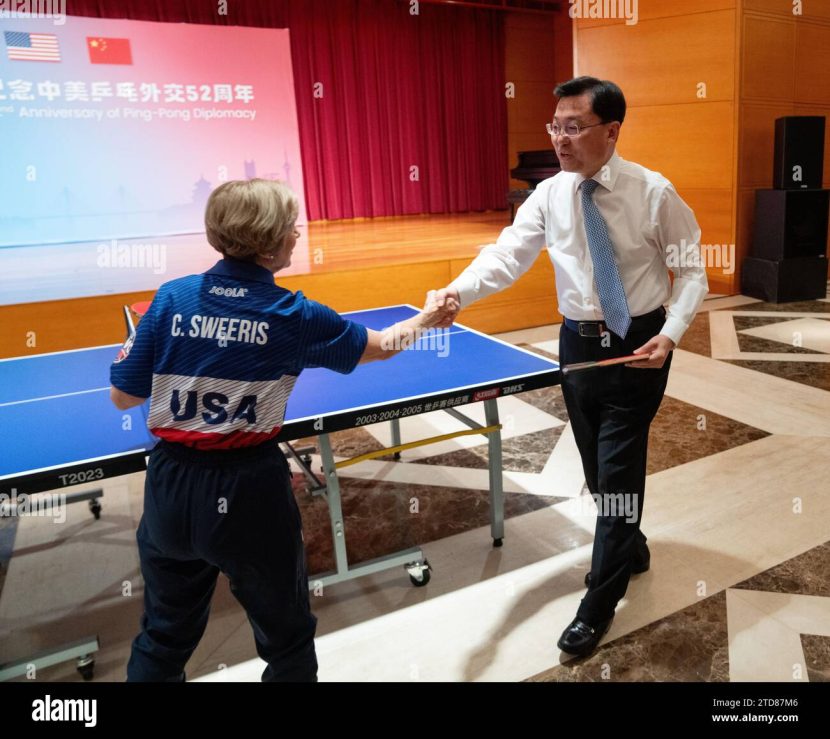There’s a photo from 1971 that John Kent, professor of supply chain management at the University of Arkansas, likes to show. It’s of a shaggy-haired 18-year-old named Glenn Cowan grinning at three-time world table tennis champion Zhuang Zedong, while holding a silk tapestry Zhuang had just given him. Cowan was a member of the U.S. […]


There’s a photo from 1971 that John Kent, professor of supply chain management at the University of Arkansas, likes to show. It’s of a shaggy-haired 18-year-old named Glenn Cowan grinning at three-time world table tennis champion Zhuang Zedong, while holding a silk tapestry Zhuang had just given him. Cowan was a member of the U.S. table tennis team who participated in the 1971 World Table Tennis Championships in Nagoya, Japan. Story has it that one morning, he overslept and missed his bus to the tournament and had to hitch a ride with the Chinese national team and met and connected with Zhuang.
Cowan and Zhuang’s interaction led to an invitation for the U.S. team to visit China. At the time, the two countries were just beginning to emerge from a 20-year period of decidedly frosty relations, strict travel bans, and trade restrictions. The highly publicized trip signaled a willingness on both sides to renew relations and launched the term “pingpong diplomacy.”
Kent, who is a senior fellow at the George H. W. Bush Foundation for U.S.-China Relations, believes the photograph is a good reminder that some 50-odd years ago, the economies of the United States and China were not as tightly interwoven as they are today. At the time, the Nixon administration was looking to form closer political and economic ties between the two countries in hopes of reducing chances of future conflict (and to weaken alliances among Communist countries).
The signals coming out of Washington and Beijing are now, of course, much different than they were in the early 1970s. Instead of advocating for better relations, political rhetoric focuses on the need for the U.S. to “decouple” from China. Both Republicans and Democrats have warned that the U.S. economy is too dependent on goods manufactured in China. They see this dependency as a threat to economic strength, American jobs, supply chain resiliency, and national security.
Supply chain professionals, however, know that extricating ourselves from our reliance on Chinese manufacturing is easier said than done. Many pundits push for a “China + 1” strategy, where companies diversify their manufacturing and sourcing options beyond China. But in reality, that “plus one” is often a Chinese company operating in a different country or a non-Chinese manufacturer that is still heavily dependent on material or subcomponents made in China.
This is the problem when supply chain decisions are made on a global scale without input from supply chain professionals. In an article in the Arkansas Democrat-Gazette, Kent argues that, “The discussions on supply chains mainly take place between government officials who typically bring many other competing issues and agendas to the table. Corporate entities—the individuals and companies directly impacted by supply chains—tend to be under-represented in the conversation.”
Kent is a proponent of what he calls “supply chain diplomacy,” where experts from academia and industry from the U.S. and China work collaboratively to create better, more efficient global supply chains. Take, for example, the “Peace Beans” project that Kent is involved with. This project, jointly formed by Zhejiang University and the Bush China Foundation, proposes balancing supply chains by exporting soybeans from Arkansas to tofu producers in China’s Yunnan province, and, in return, importing coffee beans grown in Yunnan to coffee roasters in Arkansas. Kent believes the operation could even use the same transportation equipment.
The benefits of working collaboratively—instead of continuing to build friction in the supply chain through tariffs and adversarial relationships—are numerous, according to Kent and his colleagues. They believe it would be much better if the two major world economies worked together on issues like global inflation, climate change, and artificial intelligence.
And such relations could play a significant role in strengthening world peace, particularly in light of ongoing tensions over Taiwan. Because, as Kent writes, “The 19th-century idea that ‘When goods don’t cross borders, soldiers will’ is as true today as ever. Perhaps more so.”














